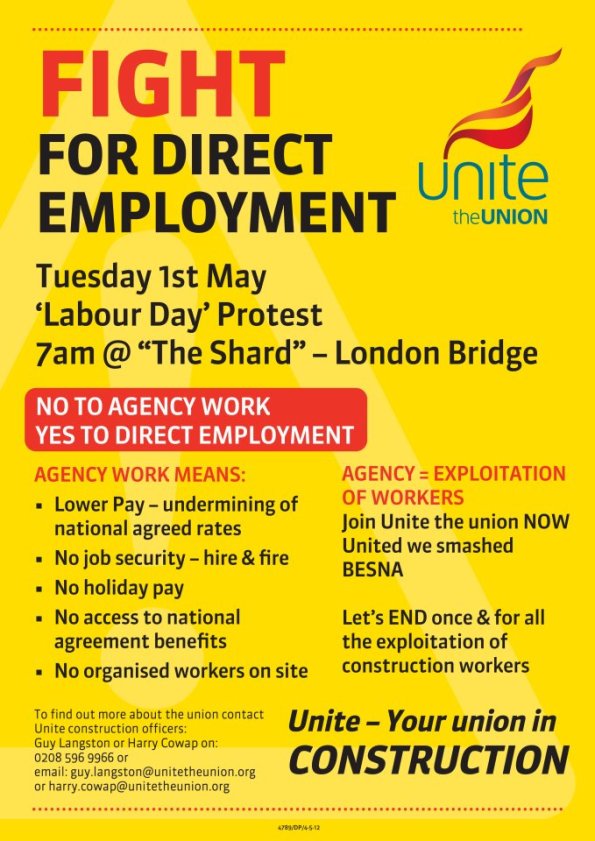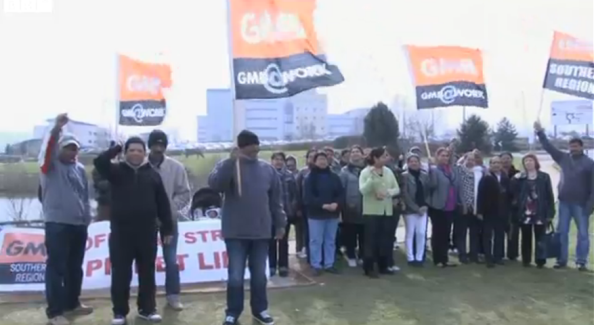Archive
London May Day Protest
Unite’s poster for early morning May Day demonstration against agency work and in support of direct employment. As part of the Sparks dispute.
Swindon Great Western Hospital cleaners’ strike on TV
Cleaners who have taken strike action for 18 days in response to racist bullying at Swindon’s Great Western Hospital were featured on regional TV at the weekend. (Skip to 42 minutes)
The cleaners, who are mostly immigrants from Goa, have a achieved an early victory as one manager has already stepped down. Locals are reporting of scabs being hired in Bristol and being bussed into Swindon.
Jerry Hicks (Sparks’ rank and file committee is on immediately after).
This video may only be available for seven days.
Sparks featured on Russia Today!
For more info see Adam Ford’s article below…
Victorious Sparks Celebrate, But Another Struggle Lies Ahead
Electricians are still celebrating following their stunning victory over their employers’ proposed pay cut contracts. The moment put the seal on a dramatic six month battle, which saw new tactics adopted by workers mistrustful of the union bureaucracy. And there can be no doubt about it, the Sparks rank-and-file group won precisely because they took a militant stance beyond the confines of the reformist trade union straitjacket. Yet they did not make a complete break with the Unite union, and another fight is on the horizon.
The grassroots-run Sparks organisation was set up in August, in opposition to the construction bosses’ plans to force the signing of what they called the Building Engineering Services National Agreement (BESNA). Under BENSA, separate pay grades would have been introduced for metalworkers (£10.50 per hour), wiring (£12), and terminating (£14), replacing the £16.25 which all electricians earned under the Joint Industry Board scheme. But the Sparks movement was set up with the intention of pressurising rather than circumventing the Unite leadership, who were correctly seen as a break on militancy following a catalogue of sellouts.
The Sparks’ suspicions were confirmed early on, when Unite chief negotiator Bernard McAulay labelled the Sparks “cancerous” in a leaked email to assistant general secretary Gail Cartmail. But despite this, there remained a consensus within Sparks that sufficient pressure could force the hands of the bureaucracy. So electricians took various forms of direct action – briefly occupying building sites, blocking traffic, and taking what were effectively wildcat strikes.
The tops were certainly spurred into action, because they were keen to keep Sparks within their dues base, but this action was deliberately delayed and generally ineffective, because the bureaucracy are committed to the corporate bosses’ profitability. McAulay, Cartmail and general secretary Len McCluskey polished off their best radical phrasemongering, and promised to fight for the living standards of their membership. Eventually, they even called two one day strike actions against Balfour Beatty – the biggest of the construction employers. But the first was called off as soon as Balfour Beatty threatened court action, and the second was scheduled to have taken place around the time a reported 90% of electricians had put pen to paper on their ‘sign or be sacked’ BESNA contracts. In other words, the two infamous email correspondents made every effort to be seen as doing something, without actually doing anything useful to the rank and filers.
At the time I wrote a rather pessimistic article on Sparks just over a month ago, the union fat cats must have thought their strategy to protect their own living standards was working. After all, electricians were shuffling in to sign up for wage cuts, so they would keep their jobs, and in fact many had joined Unite specifically in response to the Sparks’ campaign. But then came an extraordinary week, which would leave BESNA in ruins.
The Sparks independently made links with students and others in 2011
On Wednesday 15th, Sparks descended on a posh Park Lane dinner, where the suited and booted Balfour Beatty executives were slapping each other on the back for all their wealth. Taking the bigwigs and the cops by surprise, hundreds of Sparks descended on the Grosvenor Hotel, blocking central London traffic for hours. Electricians physically chased the fat cats for some time, and at one point several surrounded Balfour Beatty chief exec Ian Tyler, shouting “scum”, and chanting for the police to “arrest Balfour Beatty”.
The Thursday saw Balfour Beatty take Unite to the High Court, in an effort to get the latest strike ballot overhauled on the grounds of voting irregularities. The judge threw out the case, perhaps mindful that Sparks struck anyway back in December, after Unite’s leadership had caved in to the company. Almost immediately, Balfour Beatty withdrew from BESNA. With the biggest company gone, the six others decided the game was up. Within days, BESNA was dead.
At the moment, it is unclear exactly why Balfour Beatty precipitated the demise of BESNA. It seems impossible to believe that one day of official strike action would have held much terror for a multi-billion pound corporation. More likely, the fright the executives suffered on Park Lane played at least some role. But still, if 90% of electricians had signed up to vastly increased rates of exploitation, surely it was only a matter of time before most of the rest followed suit? And even if they didn’t, surely something else could have been arranged? The abandoning of BESNA is a huge deal, so why give away such ground so quickly?
It’s early days, but perhaps part of the answer came in a statement from Blane Judd, chief executive of the bosses’ Heating and Ventilating Contractors Association (HVCA). He told electricians that:
“Despite the best efforts of the Association and the significant progress that has been made in recent months, all seven companies who instigated the development of the BESNA have now withdrawn from the initiative. However, I can assure the membership at large that, over the next few months, the HVCA will be continuing to work towards the modernisation of the sector’s terms and conditions of employment in such a way as to incorporate a number of the principles contained in the BESNA…”
In return for the cancellation of BESNA, Unite agreed to call off any further demonstrations while ‘consultations’ take place over BESNA II. Essentially, Unite has assented to dampening down the anger of its own membership, and potentially even policing it.
Sparks clearly won the battle of BESNA, but they must continue to resist the Unite leadership’s attempts to strangle their movement. If Sparks are to finally defeat the construction companies’ attacks, they must continue to strengthen their solidarity, and draw in other groups of workers. The time will come when this requires a conscious split from Unite.

